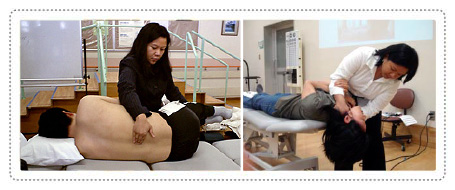

 |
 |
|
Janda Approach This lab-intensive workshop (70% lab, 30% lecture) introduces the theory, research, and concepts of Czech physician Dr. Vladimir Janda (1928 - 2002). Dr. Janda pioneered the concept of muscle imbalance syndromes, and developed a systematic evaluation and unique treatment approach to musculoskeletal pain syndromes. This workshop provides the scientific evidence to support the role of muscular imbalance in the pathogenesis of musculoskeletal pain. With functional pathologies, the actual cause of pain is rarely at the site of pain. A systematic evaluation helps clinicians quickly determine the cause of pain to initiate specific treatment using a variety of techniques. Dr. Janda developed a specific proprioceptive exercise program, Sensorimotor Training (SMT), using inexpensive exercise equipment, ideal for clinical or home exercise programs. Dynamic Neuro Muscular Stabilization courses, DNS A, B and C course These courses are limited to licensed health professionals. The nervous system establishes programs that control human locomotion, which is comprised of posture and movement. This "motor control" is largely established during the first critical years of life. Based upon the principles of neurodevelopmental kinesiology, i.e., the neurophysiologic aspects of the maturing movement system on which the Prague School was established, the scope of clinical rehabilitation options for many of our neuro-musculoskeletal patients has been expanded. The DNS approach involves every component of the movement system (i.e., muscles, joints, discs, nerves, and soft tissue), by stimulating movement control centers in the brain through activation of ideal inborn movement stereotypes. This, in turn, helps restore the structural and postural alignment of the body's neuro-musculoskeletal system by evoking the global motor patterns. Global motor patterns form the foundation of human movement and represent genetically pre-determined elements for uprighting. These patterns are essential for control of posture and stability of the spine - the pivotal center of the entire movement system through the life of the individual. This complex approach is exciting and "cutting-edge" as it provides a window into the complexity and plasticity of the CNS and its effect on the musculoskeletal system and vice-versa. Participants to these courses will be introduced to these complex approach and methods. For more information on this approach, please visit www.rehabps.com. Movement Links Seminar LOWER QUARTER UPPER QUARTER FUNCTIONAL MANAGEMENT PROGRESSION For more information about on this approach, please visit www.movementlinks.com. |
|
|
|
HOME | ABOUT MTI | WORKSHOP | TESTIMONIALS | LINKS | CONTACT |
|
© 2005 Manual Therapy International Tokyo |